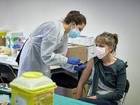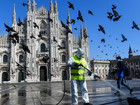Spain on Monday raised the maximum age limit for people to receive the AstraZeneca vaccine, which has faced setbacks in Europe due to safety concerns, from 55 to 65.
 Full Story
Full Story
Europe could have herd immunity against Covid-19 by July, a European Union commissioner has said, as incoming jabs are expected to speed up the continent's sluggish vaccine rollout.
 Full Story
Full Story
EU chief Ursula von der Leyen on Saturday threatened to halt exports of AstraZeneca vaccines if the bloc did not receive its deliveries first, in a worsening row over delayed shipments that has caused international tensions.
 Full Story
Full Story
A third of France's population was under a new partial lockdown Saturday to stop the spread of Covid-19, as some European countries resumed AstraZeneca vaccinations following an all-clear from EU regulators and the WHO.
 Full Story
Full Story
Italian Prime Minister Mario Draghi said Friday that he will have the AstraZeneca vaccine, after the jab was suspended earlier this week over safety concerns.
 Full Story
Full Story
British Prime Minister Boris Johnson on Friday received a first dose of AstraZeneca's Covid vaccine, at the London hospital where he fought for his life almost a year ago, assuring the public the jab is safe.
 Full Story
Full Story
Chancellor Angela Merkel said Friday she was ready to be vaccinated with AstraZeneca's coronavirus jab if she is offered it, in a bid to shore up confidence in the jab.
 Full Story
Full Story
Sardinia on Friday lost its status as the only Italian region with minimal coronavirus restrictions, as its pandemic situation took a turn for the worse.
Since March 1, the Mediterranean island had been Italy's sole low-risk "white" region, where bars and restaurants could open at night and life had almost returned to normal.
 Full Story
Full Story
There is no causal link between the death of a 43-year-old woman and the AstraZeneca virus vaccine she was given, Spanish health authorities said on Friday.
 Full Story
Full Story
The World Health Organization's vaccine safety experts gave renewed backing to the AstraZeneca Covid-19 jab on Friday, having reviewed safety data related to potential blood clotting.
 Full Story
Full Story



